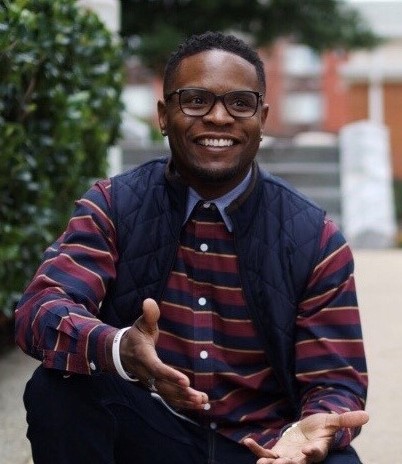HBCUs have collectively compiled a broad history that represents the level of excellence the schools produce. With notable alumni like Kamala Harris, Spike Lee, Wanda Sykes, Wale, Toni Morrison and Dr. Martin Luther King, Jr., there’s no doubt about the cultural and cross-industry impacts HBCU students have made on the world.
HP is supporting the next generation of Black talent by providing opportunities for current HBCU students through intentional programming. AfroTech had the chance to sit with two Delaware State University graduates, Yazmin Harris and Brendon Li-A-Ping, to learn how HP’s HBCU initiatives benefited them.
Kickstart Tech Careers
Yazmin Harris is a recent graduate who interned at HP before becoming a product manager — a role that allows her to explore her passions for marketing and innovation. Fellow Delaware State alumnus Brendon Li-A-Ping is a May 2020 graduate who’s now a print financial analyst with HP.
Both Harris and Li-A-Ping entered the HP universe through the company’s annual HBCU Business Challenge. The challenge allows students to gain practical experience at a global corporation that helps kick-start and grow their tech careers.
The prompt for the HP HBCU Business Challenge changes every year, so students get to come up with solutions that are applicable to the evolving business landscape. Harris’ challenge focused on future solutions around gaming as it related to HP’s OMEN brand. Li-A-Ping and his cohort were challenged to create diverse and efficient workflow solutions for a variety of HP’s verticals.
Although they participated at different times, both Harris and Li-A-Ping noted they had a life-changing experience and gained invaluable knowledge from the business challenge. Never having to pitch in this way before, the challenge taught Harris a lot about herself and the depth of her skills and abilities.
For Li-A-Ping, he discovered there are no real wrong answers in the creative process. Developing new ideas is about trust and leaning on the strength of the team around you for support.
Both graduates gained an understanding of best practices for presenting as well. “I learned the importance of storytelling when giving a presentation. It’s one of the best ways to keep your audience engaged and get your overall message across,” Harris explained.
“I learned about keeping the audience involved with what you are presenting,” Li-A-Ping added.
From networking with colleagues to building real-life solutions in their current work, the two Delaware State University alumni found the opportunity to be invaluable for growth and holistic development.
The Road Prepared by an HBCU Education
When it comes to diversity measures, critics have argued that HBCUs don’t represent the real world. This biased opinion suggests that attending schools with a majority-minority population won’t adequately prepare students for future success. This perspective has amplified systemic hurdles for Black talent, especially in tech. However, HP doesn’t allow those biases to stop it from leaning into the rich legacy of HBCUs to find and cultivate major talent.
“Delaware State gave me a foundation to interact with different people to maximize networking efforts. My connections to other students and the people I met at HP led me to start my career,” Li-A-Ping explained.
Collegiate preparation didn’t stop at the HP HBCU Business Challenge or the internships Harris and Li-A-Ping received. They credit their schools with helping them prepare to transition from student life to full-on adulting.
“The transition was not difficult. You have to be consistent in the same ways you were as a student and know that everything will come over time,” Li-A-Ping pointed out.
More Than Lip Service
Beyond the HP HBCU Business Challenge, HP also offers the HBCU Technology Conference. This event delivers impactful knowledge from visionary academics and industry leaders on digital transformation while embedding a dedicated programming for students to help them learn about emerging tech skill sets.
HP’s dedication to intentional programming like the business challenge and tech conference drew Harris and Li-A-Ping to the company.
“The programming is necessary. There are only two other African Americans on my team, and the programs help boost representation. I feel empowered, but there should be more of us in this space. And that is what I hope the programs will continue to do,” Harris said.
HP is also leveling up its commitment to HBCUs and students by launching a new HBCU Partnership Program. It will offer paid internships, an immersive on-campus cultural experience, resume workshops, mock interviews and networking opportunities for students to engage with HP industry executives.
Partnership Sealed the Deal
Harris admitted that HP wasn’t on her radar when looking at future tech companies for employment. However, through the business challenge and partnership with HBCUs, she learned about everything the organization offers. What sealed the deal was the work culture.
Li-A-Ping agreed. “I love the mobility, work-life balance and culture.”
In addition to the external-facing programs targeted toward HBCU students, HP has internal collaborative efforts that empower its team members. Business Impact Networks (BINs) are volunteer communities of HP employees connected to HP sites or remote locations who come together to leverage diverse perspectives and build a more inclusive culture.
“It’s a network for your specific culture with planned events that make people feel included and a part of a community. It helps connect us outside of work,” Harris stated.
Both Harris and Li-A-Ping advise future program participants to be authentic, actively engage and do their best.
Click here to learn more about HP and the intentional work to partner with HBCUs.


